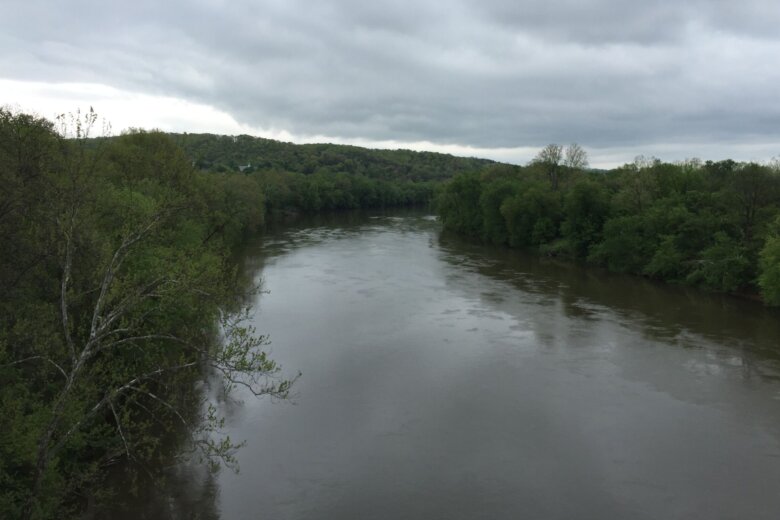This article was republished with permission from WTOP’s news partners at Maryland Matters. Sign up for Maryland Matters’ free email subscription today.

This content was republished with permission from WTOP’s news partners at Maryland Matters. Sign up for Maryland Matters’ free email subscription today.
A dormant court case that could lead to the construction of a natural gas pipeline beneath the Potomac River and Western Maryland Rail Trail has come back to life, and the utility company behind it is quietly renewing its permits as it continues to fight the matter in court.
At issue is a 3.5 mile pipeline in Maryland, sought by TC Energy which is based in Canada, that would bring natural gas from Pennsylvania to West Virginia’s panhandle. Environmentalists say that this could endanger drinking water for communities in Washington County and others all the way to Washington, D.C., while business leaders have argued that natural gas is critical for the economic development of Western Virginia’s panhandle.
In 2019, the Board of Public Works voted unanimously not to grant an easement for TC Energy’s “Eastern Panhandle Expansion Project,” and the company filed an appeal in the United States Court of Appeals for the Fourth Circuit. The case had been sitting there until the U.S. Supreme Court ruled in PennEast Pipeline Co. v. New Jersey this summer that pipeline projects with federal approval can seize state-owned land to build natural gas pipelines.
Since then, Columbia Gas Transmission, LLC. — which is a part of TC Energy — asked the Fourth Circuit to rule in its favor based on the New Jersey decision.
Columbia Gas had received federal approval through the Federal Energy Regulatory Commission back in 2018 and contended that they can use the federal government’s power of eminent domain to seize Maryland land to build a pipeline through the Natural Gas Act. TC Energy said in a statement that they plan to complete the pipeline within a year of getting approval to start constructing.
“We only consider condemnation as a ‘last resort’ when constructing a project of this nature, but it was unfortunately necessary in this case despite reaching agreement with all private landowners along the route. While the process to uphold federal authority under the Natural Gas Act continues at the 4th Circuit, we continue to work with permitting agencies to ensure that all necessary permits are in place. We plan to complete construction within a year of initiation,” TC Energy said in a statement.
While moving through the court system, Columbia Gas has also been renewing the state and federal permits necessary to start pipeline construction. In August, Columbia Gas asked the Maryland Department of Environment to extend its state non-tidal wetlands and waterways permit, which required the company to begin construction by August 2021.
Within three days, the department approved to extend the permit to allow the construction to begin by August 2023, according to documents. Environmentalists took issue with how quickly the extension was approved, especially after top state officials, including Gov. Lawrence J. Hogan Jr. (R), have publicly expressed that this pipeline is not in the best interest for Maryland.
“Maryland should be using all the tools at its disposal to stop a project that it has clearly stated it doesn’t think is good for Maryland,” said Josh Tulkin, director of the Maryland Sierra Club.
The Maryland Commission on Climate Change has recommended that the state move away from gas systems in building and transportation sectors, and state lawmakers are preparing a comprehensive climate bill for the next legislative session that aims to reduce carbon emissions in the transportation, utility and building sectors. In 2017, Hogan signed a bill passed by the General Assembly that banned fracking in Maryland.
“The idea of building a new pipeline and expanding gas on the one hand, while on the other hand, coming up with strategies to move existing people off of gas … is illogical,” Tulkin said.
However, officials at the Department of the Environment responded that not much has changed since they first issued Columbia Gas a permit in 2018.
The department issued a permit for the Potomac pipeline in 2018 “after a year of robust assessment and public review” Jay Apperson, the agency’s spokesman, said in a statement.
“From the perspective of impacts to the Potomac River and MDE’s confidence in the safeguards it put in place in the permit, nothing has changed since 2018. Therefore, MDE allowed the relatively routine request for an extension on the time frame for potential construction,” he continued.
But advocates contend that a lot has changed since 2018 and the department could have done more to impede pipeline construction. For example, the agency could have taken more time to do a comprehensive climate analysis on the pipeline as a whole, said Tulkin. “Our understanding of potential climate impacts of gas have changed,” he said.
The Department of the Environment could have also tried to deny Columbia Gas the required water quality certification under the Clean Water Act, said Ryan Maher, an attorney for the Environmental Integrity Project, an environmental watchdog organization.
And strong opposition from state officials can halt pipeline projects. For instance, although the U.S. Supreme Court sided with PennEast over the state of New Jersey, the company ultimately canceled its pipeline project in September due to lack of support from the state in acquiring environmental permits.
It also remains a question whether Mountaineer Gas Company, the recipient of the gas from the proposed Potomac pipeline, still needs this pipeline or if it has found alternative sources since the proposed pipeline has been in flux for years. An official at Mountaineer Gas Company could not be reached.
There is no requirement that the permit extension had to be approved so quickly, said Anne Havemann, an attorney for the Chesapeake Climate Action Network.
“They missed an opportunity there,” she said.
Mixed efforts between state agencies
Since the Potomac pipeline case picked up again in the Fourth Circuit, the Office of the Attorney General has been continuing to oppose the pipeline. In a recent brief, Assistant Attorney General Adam Snyder argued that the decision in the New Jersey case does not automatically conclude the same for Columbia Gas.
More specifically, Snyder cited the 11th amendment, which declares that federal courts cannot listen to a case that is brought against the state from citizens of another state. Eleventh Amendment concerns were not resolved in the New Jersey case and therefore should be heard before the Fourth Circuit, he continued.
Upper Potomac Riverkeeper Brent Walls said he was concerned about the lack of unity between state agencies on the issue of the pipeline.
“This is very, very concerning — when you have two ends of the government working under two different philosophies … and they’re not working together to protect the state’s resources, especially when the governor of the state had made that stand very publicly,” he said.
While the governor, the Office of the Attorney General and environmental advocates are united in opposing the proposed Potomac pipeline, one state agency seems to be clearing a path for the pipeline company, advocates say.
Apperson said the Maryland Department of the Environment has continuously sought the advice of the Office of the Attorney General throughout the permitting process, but he did not specify whether the agency had consulted with and received support from the attorney general’s office on MDE’s decision to extend Columbia Gas’s state permit in August.
“It feels like MDE is not aligned with the goals of the state,” Walls said.
There is an upcoming opportunity for the public to ask questions and express concerns about the pipeline.
Columbia Gas’s federal wetlands permit also recently expired, and the company has requested reauthorization, which is currently under review by the U.S. Army Corps of Engineers, according to Sarah Lazo, spokeswoman for the Corps’ Baltimore District. The Army Corps can make the decision as early as January, Lazo said.
Advocates and state lawmakers are imploring MDE to urge the Army Corps to require Columba Gas to apply for an individual federal permit for the Potomac pipeline project, instead of reauthorizing it under a general federal permit. An individual permit is required for projects with more significant impacts while general permits allow projects to continue with little or no delay, according to the Clean Water Act.
“An individual permit will enable regulators to fully examine the impacts of the project. And it will allow the public — who have been deeply concerned about this project since it was first proposed — the opportunity to comment,” dozens of lawmakers wrote in a letter to Maryland Secretary of the Environment Ben Grumbles last week.
The Department of the Environment is reviewing the request made in the letter, according to Apperson. And the Army Corps is coordinating their permit review with the state agency, Lazo said.
Although an individual permit may not stop the proposed pipeline, it would give the state the opportunity to obtain more information and ask for more safeguards, said Del. David Moon (D-Montgomery), who was one of the lawmakers who signed the letter to Grumbles.
“The state banned fracking, and it seems like we’re putting a huge asterisk on that ban if we continue to enable, facilitate and approve permits for fracked gas,” Moon said.
Moon also noted that the project received rare bipartisan opposition from Hogan and Democrats in the General Assembly.
“It remains to be seen whether the coalition that claims they are against fracking and this pipeline will continue to do everything they can to keep this project from going forward,” Moon said.








